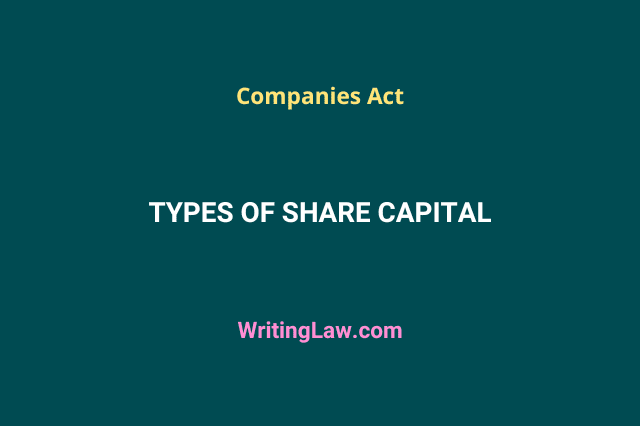
A share is a unit of capital representing the ownership connection between the company and the shareholder. It is often known as stocks or equity. The amount of shares a person owns defines the ownership percentage of that person in the company. The most common types of shares are preferred shares and equity shares.
Further, share capital is the total amount of funds a company raises by issuance of shares. It serves as the financial backbone of a company.
There are five types of share capital. This article discusses these types in brief.
Types of Share Capital
The five types of share capital are:
Here’s more about all of these.
Authorised Share Capital
The first type of share capital is the authorised share capital. Authorised share capital is the maximum number of shares a firm can issue. Memorandum of Association limits it to a certain amount.
While a company’s constitutional documents may specify a particular amount of authorised share capital, it is not required to be issued immediately. The corporation can issue shares gradually, up to the authorised limit.
Companies can typically alter their authorised share capital by following the given process:
- Firstly, the company has to get the shareholder’s approval through a special resolution.
- Secondly, it has to make changes in the company’s documents to reflect the changes in authorised share capital.
- Lastly, it has to file the required documents with the Registrar of the Companies.
Public companies raise authorised share capital through an initial public offering (IPO) or follow-on public offering (FPO). In contrast, private companies raise authorised share capital through private placement or rights issues.
Related: Allotment of Shares Under Company Law in India
Issued Share Capital
The second type of share capital is issued share capital. Issued share capitals are the authorised shares a company has actually sold or issued to its shareholders. Shareholders who own issued shares have specific rights, including voting at shareholder meetings and receiving dividends.
Issued shares may either be fully paid up or partially paid up. Fully paid-up shares are those for which shareholders have paid the entire value of the shares. Partially paid-up shares are those for which shareholders have paid a part of the whole value, with the balance to be paid anytime later or at the company’s request.
For example, a company has an authorised share capital of 10000 and decides to issue 3000 shares. The investors buy these shares, so the shares sold by the company represent the issued share capital.
Unissued Share Capital
The third type of share capital is unissued share capital. Unissued share capital is those authorised share capital that has not been sold or distributed to shareholders. Simply put, these shares are part of the total share capital the firm is legally permitted to issue but have not been distributed to its investors.
Unissued shares indicate the possibility of future equity funding for the company. The company can issue these shares later to raise extra capital for business expansion, investment possibilities, or other objectives if needed.
For example, a company has an authorised share capital of 10000 shares but has issued only 3000 shares. The remaining 7000 shares represent the unissued share capital.
Subscribed Share Capital
The fourth type of share capital is subscribed share capital, which investors have formally agreed to or promised to buy in the future. Subscribed share capital is typically subscribed as part of an initial public offering (IPO). The company profits from additional funds due to the shareholder’s commitment, similar to giving it a financial boost.
For example, a company sells 10000 shares to expand its operations. Every share is worth Rs 300. Investors expressed their interest and promised to purchase the shares but still needed to make payments. Thus, the subscribed capital is Rs 30 lakhs or 3 million (10000 shares x Rs 300). The example indicates that once investors pay for the promised shares, the company should soon receive Rs 30 lakhs or 3 million.
Paid-Up Share Capital
The paid-up share capital is the last type discussed in this article. It is the portion of issued share capital for which shareholders have paid the whole amount or value. It simply denotes the total sum of money that the company has received from its shareholders for the shares that have been issued.
For example, a company has issued 10000 shares at Rs 100 each. The investors bought all the shares and paid Rs 100 each. The paid-up capital would be 10 lakhs or 1 million.
- Understanding the Legislative Branch of the Indian Government - 6th May 2024
- Appointment, Oath, and Removal of Constitutional Posts in India - 28th April 2024
- Powers of Income Tax Authorities in India - 26th April 2024







